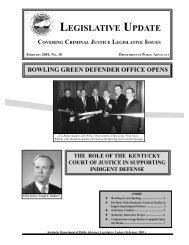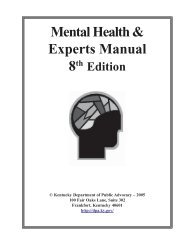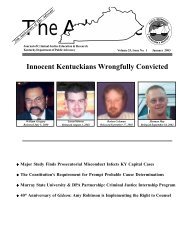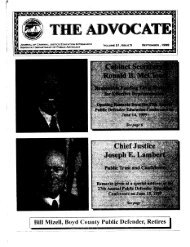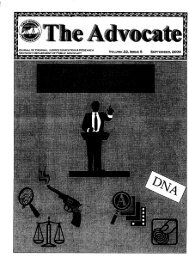May 2002 - Department of Public Advocacy
May 2002 - Department of Public Advocacy
May 2002 - Department of Public Advocacy
You also want an ePaper? Increase the reach of your titles
YUMPU automatically turns print PDFs into web optimized ePapers that Google loves.
The Influence <strong>of</strong> Race and the<br />
Defense Lawyer’s Responsibilities<br />
THE ADVOCATE Volume 24, No. 3 <strong>May</strong> <strong>2002</strong><br />
Last year I served on a panel at the <strong>Department</strong> <strong>of</strong> <strong>Public</strong><br />
<strong>Advocacy</strong>’s 29 th Annual Conference on race and the criminal<br />
justice system. The following is an edited version <strong>of</strong> my<br />
comments at that panel.<br />
Steve Bright has said the following, and I agree completely<br />
with him: “Racial bias influences every aspect <strong>of</strong> the criminal<br />
justice system. African-Americans, Latinos and members <strong>of</strong><br />
other racial minorities are more likely than similarly situated<br />
white people to be stopped by the police, to be arrested after<br />
being stopped, put in choke holds by arresting <strong>of</strong>ficers, denied<br />
bail, denied probation and given harsher sentences including<br />
the death penalty.” I believe that from the moment<br />
the <strong>of</strong>ficer sets out at night and decides what neighborhood<br />
he or she is going to drive into through the decisions made<br />
regarding what kind <strong>of</strong> stop he is going to make, through<br />
who gets out on bail, through who gets probation and who<br />
gets treatment, who gets the good deal and who gets the take<br />
it or leave it deal, who gets the death penalty notice and who<br />
doesn’t, I absolutely believe that race is at the core <strong>of</strong> those<br />
decisions.<br />
If Steve Bright is right on that, then we as public defenders<br />
have an absolute obligation at every one <strong>of</strong> those flash points,<br />
from the moment <strong>of</strong> arrest until the end <strong>of</strong> that case to raise<br />
race as an issue and to litigate it fully. If you don’t believe<br />
what Steve and I are saying, or if you need some background<br />
on some statistics to show that is true, Mark Mauer <strong>of</strong> The<br />
Sentencing Project has written a book Race to Incarcerate<br />
(1999) which gives careful and substantial support to the<br />
manner in which race is inherent in each <strong>of</strong> those stages. I<br />
would encourage all public defenders and other criminal defense<br />
practitioners to get that book and to interpret and translate<br />
what’s in there for your judges, your prosecutors, your<br />
police and for each other.<br />
We raise race really in two ways, 1) in litigation, and 2) as<br />
managers, directing attorneys and participants in the criminal<br />
justice process. What we are really trying to do by litigating<br />
in every one <strong>of</strong> these instances with our clients and by<br />
being co-managers <strong>of</strong> the system is to change Kentucky from<br />
what was the reality in 1954 toward the vision that Senator<br />
Neal and Representative Crenshaw have for our society.<br />
That’s really what we’re doing, we’re about changing Kentucky.<br />
Of course you are representing your individual clients.<br />
But, when you represent your individual clients you are<br />
also changing Kentucky for the better.<br />
Let me give you a couple <strong>of</strong> brief examples. Back when I<br />
began my 14 years practicing in the trial arena in the Richmond<br />
<strong>of</strong>fice, one <strong>of</strong> the things that I would do from time to<br />
time was particularly, mostly in serious cases, murder cases,<br />
was to attack the jury<br />
commissioner’s system<br />
that we had in place then.<br />
Most <strong>of</strong> you are young<br />
enough not to member that<br />
system. In the not too distant<br />
past, our circuit judge<br />
Ernie Lewis, <strong>Public</strong> Advocate<br />
would appoint 5 jury commissioners, most <strong>of</strong> them appearing<br />
to be Presbyterians in Richmond, and the jury that resulted<br />
looked like a pot-luck supper in the Presbyterian church. Now,<br />
try to try a case consisting <strong>of</strong> 12 Presbyterians. It’s not pretty.<br />
(By the way, I have been Presbyterian for the last 25 years).<br />
So I, from time to time, would raise that issue statistically.<br />
Once I began trying the case, when I would go out after<br />
choosing a jury, or to go out to choose a jury after voir dire,<br />
this particular judge would tell the panel how certain people<br />
were raising this issue. Those <strong>of</strong> you who remember this<br />
particular judge after he exhausted talking about all the people<br />
on the walls in the courtroom would then go in to describing<br />
how some lawyers in Kentucky were try to challenge the<br />
fairness <strong>of</strong> the process. Then I’d walk back in and try to try<br />
a case in front <strong>of</strong> the jurors who had just heard the judge’s<br />
diatribe.<br />
Raising that issue, and Gail Robinson’s raising it and Kevin<br />
McNally’s raising it and people all over Kentucky raising<br />
that, including civil practitioners resulted in a change. The<br />
Kentucky Supreme Court was receptive to the issue, and<br />
changed the rules so that what you now have is the ability to<br />
try a case before a true cross section <strong>of</strong> the community. Juries<br />
now look more like you’re trying it at Wal-Mart than at<br />
the Presbyterian Church, because you’re getting a computer<br />
selected cross section using driver’s license and voter’s registration.<br />
I use that as an example because that’s a way you<br />
can go at the race issue, litigating it one case at a time, and<br />
ultimately changing a system.<br />
I have a second example. I tried a capital case toward the end<br />
<strong>of</strong> my time in the Richmond Office. Three migrant workers<br />
from Taumelipas, Mexico, were charged with having murdered<br />
2 white men in Clark County. Clark County had experienced<br />
a lot <strong>of</strong> organizing by growers and other white folks<br />
against migrants in Winchester and in Clark County. As we<br />
neared the time <strong>of</strong> our trial, we received an <strong>of</strong>fer from the<br />
prosecution <strong>of</strong> life without parole for 25 years. That’s what<br />
the prosecutor thought that they could get if they tried the<br />
case. We had made a motion for a change <strong>of</strong> venue and it<br />
used statistical analysis to show the attitudes towards specifically<br />
Mexican migrant workers in Clark County at that<br />
time. A very wise circuit judge delayed ruling on that until the<br />
day before the trial was to start. On Friday afternoon, he<br />
called us all together, while the <strong>of</strong>fer <strong>of</strong> life w/o parole for 25<br />
14



